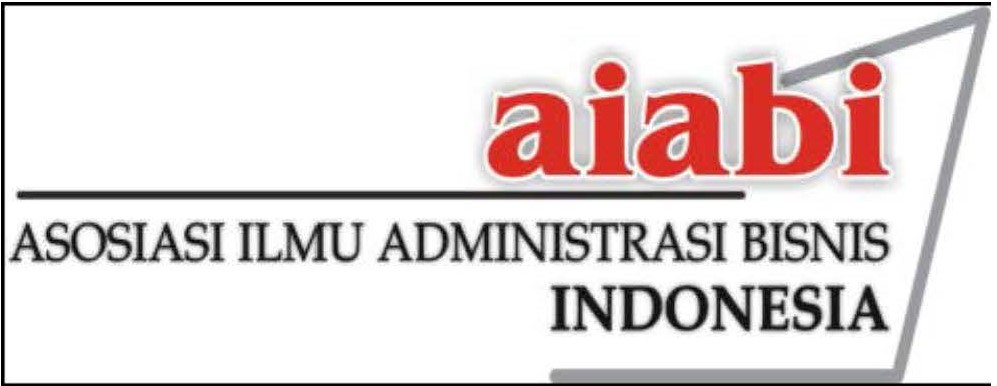PERAN FEASIBILITY DAN ENTREPRENEURIAL SELF-EFFICACY DALAM MEMEDIASI PENGARUH PENDIDIKAN KEWIRAUSAHAAN TERHADAP NIAT BERWIRAUSAHA
Abstrak
In line with the government's efforts to encourage the growth of entrepreneurs among the younger generation, several universities in Indonesia (one of them is Universitas Brawijaya) has set an entrepreneurship course as one of the mandatory courses at the undergraduate level. However, to date, no systematic research and publications have been found on the effectiveness of those entrepreneurship education. Therefore, by using the theory of perception, the purpose of this study is to evaluate whether an entrepreneurship education provided to students of Universitas Brawijaya is able to foster their entrepreneurial intentions. Specifically, this study analyzes the effect of entrepreneurship education on entrepreneurial intentions mediated by feasibility and entrepreneurial self-efficacy. This research was conducted using a quantitative approach. The population of this research is all active students of Universitas Brawijaya who have taken entrepreneurship courses. The sampling technique used was quota sampling with a total of 150 respondents representing 15 faculties. The data collection method was carried out using a survey questionnaire. The analytical tool used in this study is Partial Least Square (PLS). The results of this study indicate that feasibility and entrepreneurial self-efficacy mediate the effect of entrepreneurship education on the student’s entrepreneurial intentions.
Selaras dengan upaya pemerintah untuk mendorong tumbuhnya wirausaha di kalangan generasi muda, beberapa universitas di Indonesia (termasuk Universitas Brawijaya) telah menetapkan mata kuliah kewirausahaan sebagai salah satu mata kuliah wajib pada strata S1. Namun, sampai saat ini belum ditemukan penelitian serta publikasi yang sistematis tentang efektifitas pendidikan kewirausahaan tersebut. Untuk itu, dengan menggunakan teori persepsi, tujuan penelitian ini adalah untuk mengevaluasi apakah pendidikan kewirausahaan yang diberikan kepada mahasiswa Universitas Brawijaya mampu menumbuhkan niat berwirausaha bagi mahasiswa. Secara spesifik, penelitian ini menganalisis pengaruh pendidikan kewirausahaan terhadap niat berwirausaha dengan dimediasi oleh feasibility dan entrepreneurial self-efficacy. Penelitian ini dilakukan dengan menggunakan pendekatan kuantitatif. Populasi penelitian ini adalah seluruh mahasiswa aktif Universitas Brawijaya yang telah menempuh mata kuliah kewirausahaan. Teknik sampel yang dipergunakan adalah teknik quota sampling dengan total responden berjumlah 150 dari 15 fakultas yang ada di Universitas Brawijaya. Metode pengumpulan data dilakukan dengan menggunakan survey questionnaire. Alat analisis yang digunakan adalah Partial Least Square (PLS). Hasil penelitian ini menunjukkan bahwa feasibility dan entrepreneurial self-efficacy memediasi pengaruh pendidikan kewirausahaan terhadap niat berwirausaha.
Kata Kunci
Teks Lengkap:
PDFReferensi
Ahmad, A. (2018). Evaluasi program mahasiswa wirausaha dengan model cipo di Universitas Brawijaya dan Universitas Negeri Malang. Jurnal Penelitian Dan Evaluasi Pendidikan, 22(2), 154–167. https://doi.org/10.21831/pep.v22i2.16577
Ajzen, I. (1991). The Theory of Planned Behavior. Organizational Behavior And Human Decision Processes, 179-211.
Bandura, A. (1994). Self-Efficacy. Human behavior, 71-81.
Bandura, A. (1977). Self-Efficacy: Toward a unifying Theory of behavioral Change. Pyschological, 191-215.
Boukamcha, F. (2015). Impact of training on entrepreneurial intention: an interactive cognitive perspective. European Business Review, 27(6), pp.593–616. https://doi.org/10.1108/EBR-12- 2014-0090.
Boyd, N. G., & Vozikis, G. S. (1994). The Influence of Self-Efficacy on the Development of Entrepreneurial Intentions and Actions. Entreprenurship Theory & Practice, 63-77
Brawijaya, U. (2019). Visi, Misi Universitas Brawijaya. Retrieved from Universitas Brawijaya: https://ub.ac.id/about/vision-and-mission/
Chen, C.C, Greene, P. G., & Crick, A. (1998). Does Entrepreneurial Self-Efficacy Distinguish Entrepreneurs From Managers? Journal of Business Venturing, 295 - 316.
Chen, Y., & He, Y. (2011). The impact of strong ties on entrepreneurial intention An empirical study based on the mediating role of self-efficacy . Journal of Chinese Entrepreneurship, 147-158.
Chimucheka, T. (2013). The Impact of Entrepreneurship Education on the Establishment and Survival of Small, Micro and Medium Enterprises (SMMEs). Journal of Economics, 4(2), 157–168.
Dharmawati, H. M. (2016). Kewirausahaan. Jakarta: Rajawali pers.
Dian, O. (2019). UB Jadi Pusat Pengembangan Wirausaha. Prasetya Online. Retrieved from https://prasetya.ub.ac.id/berita/UB-Jadi-Pusat-Pengembangan-Wirausaha-22894-id.html
Farashah, A. D. (2013). The process of impact of entrepreneurship education andtraining on entrepreneurship perception and intention Study of educational system of Iran. Education Training, 868-885.
Fayolle, A. (2008). Entrepreneurship Education At A Crossroads: Towards A More Mature Teaching Field. Journal of Entreprising Culture, 325 - 337.
Fayolle, A., & Gailly, B. (2015). The Impact of Entrepreneurship Education on Entrepreneurial Attitudes and Intention: Hysteresis and Persistence. Journal of Small business management, 75-93.
Gelaidan, H. M., & Abdullateef, A. O. (2017). Entrepreneurial intentions of business students in Malaysia: the role of self-confidence, educational and relation suppor. Journal of Small business and Entreprise Development, 24(1). doi:http://dx.doi.org/10.1108/JSBED-06-2016-0078
GEM. (2018). Global Entrepreneurship Monitor 2017/2018. In Global Entrepreneurship Monitor. Retrieved from http://www.gemconsortium.org/report/50012
Gibson, J.L., Ivancevich, J.M., Donnelly Jr.J.H., & Kanopaske, R. (2009). Organizations: Behavior, Structure, Process. 14th ed. Mc.Graw-Hill: New York.
Hattab, H. W. (2014). Impact of Entrepreneurship Education on Entrepreneurial Intentions of University Students in Egypt. The Journal of Entrepreneurship, 1-18. doi:10.1177/0971355713513346
Izquierdo, E., & Buelens, M. (2008). competing Models of Entepreneurial Intention : The Influence of Entrepreneurial Slef-Efficacy and Attitudes. Internationalizing Entrepreneurship Education and Training, 1-31.
Kristiansen, S., & Indarti, N. (2004). Entrepreneurial Intention Among Indonesian and Norwegian Students. Journal of Entreprising culture, 55-78.
Krueger Jr. N.F., Reilly, M. D., & Carsrud, A. L. (2000). Competing Models of Entrepreneurial Intention. Journal of Business Venturinig, 411- 432.
Krueger, N.F. and Brazeal, D.V. (1994), Entrepreneurial Potential and Potential Entrepreneur”, Entrepreneurship Theory and Practice, Vol. 18 No. 3, pp. 91-104.
Linan, F. (2004). Intention Based Model Of Entrepreneurship Education. Research Gate, 3(january 2004), 1-30. doi:10.1371/journal.pone.0007418 Linan, F., Rodriguez-Cohar, J. C., & Cantuche, J. R. (2011). Factors Affecting Entrepreneurial Intention Levels: A Role for Education. International Entrepreneurship Management, 195-218.
Linan, F., D. Urbano & M. Guerrero (2011), ‘Regional variations in entrepreneurial cognitions: start-up intentions of university students in Spain’, Entrepreneurship and Regional Development, 23, 187–215.
Luthans, F., 2011. Organizational Behavior: An Evidence Based Approach. 12th ed. McGraw-Hill: New York.
Malebana, M. J., & Swanepoel, E. (2014). The relationship between exposure to entrepreneurship education and entrepreneurial self-efficacy. Southern African Business Review, 18(1), 1–26. https://doi.org/10.25159/1998-8125/5630
McGee, J. E., Peterson, M., Mueller, S. L., & Sequeira, J. M. (2009, July). Entrepreneurial Self-Efficacy: Refining the Measure. Entrepreneurship Theory & Practice, 965-988. doi:10.1111/j.1540-6520.2009.00304.x
Nawangpalupi, C. B., PawitNawangpalupi, C. B., Pawitan, G., Gunawan, A., Widyarini, M., Putri, F. E., & Iskandarsjah, T. (2016). Entrepreneurship In Indonesia: Conditions and Opportunities for Growth and Sustainability. Bandung.an, G., Gunawan, A., Widyarini, M., Putri, F. E., & Iskandarsjah, T. (2016). Global Enrepreneurship Monitor 2015/2016. Entrepreneurship In Indonesia: Conditions and Opportunities for Growth and Sustainability.
Ozaralli, N. & Rivenburgh, N. K. 2016. Entrepreneurial Intention: Antecedent to Entrepreneurial Behavior in the USA and Turkey. Journal of Global Entrepreneurship Research, pp. 1-32.
Prabhu, V. P., McGuire, S. J., Drost, E. A., & Kwong, K. K. (2012). Proactive Personality and Entrepreneurial Intent Is Entrepreneurial Self-Efficacy a Mediator or Moderator. International Journal of Entrepreneurial Behaviour & Research, 559-586.
Putri, B.A.K. (2019). Brawjaya Entrepreneur Festival Ingin Bentuk Mindset Mahasiswa Agar Mau Menjadi Wirausahawan. Suryamalang.com. Retrieved from https://suryamalang.tribunnews.com/2019/10/31/brawijaya-entrepreneur-festival-ingin-bentuk-mindset-mahasiswa-agar-mau-jadi-wirausahawan
Ratnasari, E., Hakim, A., & Hayat, A. (2013). Implementasi Program Mahasiswa Wirausaha (PMW) dalam Mewujudkan Mahasiswa Enterpreneur (Studi pada Universitas Brawijaya Malang). Jurnal Administrasi Publik (JAP), 1(6), 1276–1285.
Sanchez, J. C. (2013). The Impact of an Entrepreneurship Education Program on Entrepreneurial Competance and Action. Journal of Small Business Management, 447 - 465 .
Segal, G., Borgia, D., & Schoenfeld, J. (2005). The Motivation To Become an Entrepreneur. International Journal of Entrepreneurial Behaviour and Reaserch, 42 - 57.
Shapero, A. and Sokol, L. (1982) ‘The social dimension of entrepreneurship’, in Kent, C.A., Sexton, D.L. and Vesper, K.H. (Eds.): Encyclopedia of Entrepreneurship, Prentice-Hall, Englewood Cliffs, New Jersey, pp.72–90.
Shinnar, R. S., Hsu, D. K., & powell, B. C. (2014). Self-Efficacy,Entrepreneurial Intention, And Gender: Assessing The Impact Of Entrepreneurship Education Longitudinally. The International Journal of Management Eduaction, 1-10.
Sieger, P., Fueglistaller, U., & Zellweger, T. (2016). Student Entrepreneurship 2016: Insights From 50 Countries. St. Gallen/Bern: KMU-HSG/IMU. International GUESSS Report, 2, 3.
Solesvik, M. Z. (2013). Entrepreneurial Motivations and Intentions: Investigating The Role of Education Major. Education + Training, 55(3), 253 - 271.
Sugmawati, D., Afrianty, T.W. (2018). Pengaruh Self Efficacy terhadap In-Role Performance Karyawan dengan Motivasi Kerja Sebagai Variabel Moderator ( Studi pada Karyawan Bank Central Asia KCU Borrobudur Malang). Jurnal Administrasi Bisnis (JAB), 61(4), 20–28.
Thoha, M. 2015. Perilaku Organisasi: Konsep Dasar dan Teori. PT. Raja Grafindo Persada: Jakarta
Truxillo, D.M., Bauer, T.N., & Erdogan, B. (2016). Psychology and Work: Perspectives on Industrial and Organizational Psychology. Routledge: New York.
Universitas Brawijaya. 2019. Visi dan Misi. Retrieved from https://ub.ac.id/id/about/vision-and-mission/
Verheul, I. & Stel, A. V. (2010). Entrepreneurial diversity and economic growth. In Bonnet, Lema, &Auken (Eds.), The Entrepreneurial Society: How to Fill the Gap Between Knowledge and Innovation. Edward Elgar Publishing Limited: UK.
Wilson, F., Kickul, J., & Marlino, D. (2007). Gender, Entrepreneurial Self-Efficacy, and Entrepreneurial Career Intentions: Implications for Entrepreneurship Education. Entrepreneurship Theory & Practice, 387-406.
DOI: https://doi.org/10.24198/adbispreneur.v4i3.25181
Refbacks
- Saat ini tidak ada refbacks.









